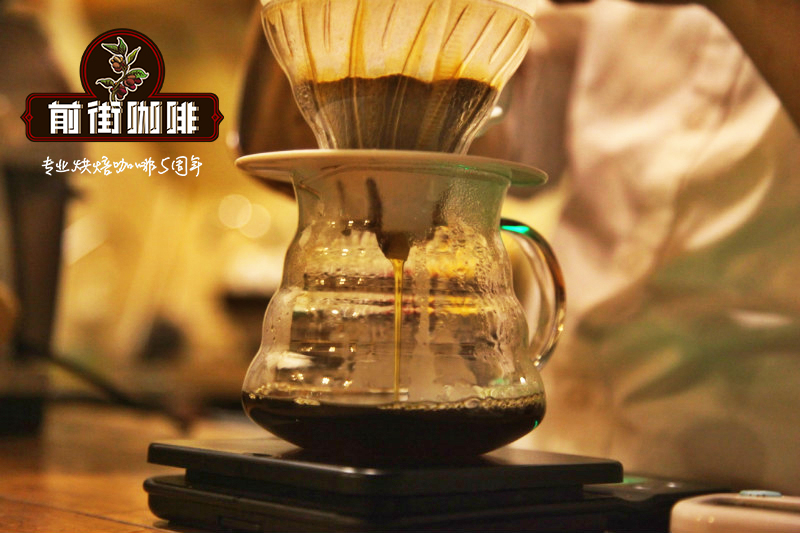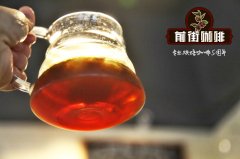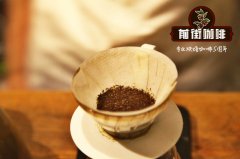How much is the scaa barista certification? Where can I take the scae international barista qualification certificate?

Professional coffee knowledge exchange more coffee bean information please follow the coffee workshop (Wechat official account cafe_style)
If you want to ask me, why do I need to be trained in a professional barista certification course?
The establishment of any system is actually the formation of learning methods. Therefore, simply using the time of practice to repeat unthought and digested behavior is quite inefficient and even misleading.
Training system, coffee professionals coffee shops or coffee lovers can be tailor-made some appropriate training courses, and through the training courses to develop some good learning methods, thinking habits and guiding exercises.
How do professional baristas become? How to take the barista qualification certificate?
Step 1: establish basic senses and learn sensory analysis (cup tester)
To put it simply, it uses people's basic sensory organs (taste, smell, touch, vision and hearing) as a measuring tool to describe and evaluate coffee. For example, if you smell flowers in your coffee, this cup of coffee is good from an olfactory point of view. You can evaluate it as a cup of coffee with floral scent. To have the ability to evaluate coffee, we need classroom training and practice, such as half a day or a day of olfactory training and teacher correction, you will be exposed to a lot of beans, and finally you can have this "ruler" to evaluate coffee to quickly distinguish between positive and negative flavors in coffee.
However, without systematic learning or sensory correction, it is difficult for a barista or brewer to correctly describe coffee and find out what makes coffee taste negative. In this way, no matter making espresso or hand-brewed coffee, without the above sensory organs' judgment of coffee, the so-called brewing time and proportion will become pale, because it is impossible to distinguish what is good coffee and what is problematic coffee.
Add: the sense is the measuring tool, and make it accurate.
Related courses: SCA Cup testing course CUPPING
Step 2: learn the theory and practice of coffee grinding and extraction.
To put it simply, brewing and brewing coffee means "beans are ground and brewed with water", so all brewing methods are based on grinding and extraction, as are Italian thickeners, and so are hand brewing. In popular terms, you choose to break the coffee beans, boil them in the pot where you cook porridge, remove the dregs and drink. Or use a "coffee shop common machine" that specializes in rapid extraction of coffee to extract the liquid from the coffee. No matter which method you use, will you control your variables? It involves a lot of content: temperature, time, powder thickness, water volume, and so on. These are the second step in learning coffee.
Add: the significance of grinding extraction is to use appropriate grinding extraction on the basis of the right senses to maximize the advantages of coffee. We want MAX, not flat.
Related courses: SCA grinding and extraction
Step 3: become a skilled hand brewer and espresso maker, using all kinds of coffee utensils.
Because both the hand brewer and the espresso maker are based on grinding extraction, generally speaking, coffee practitioners now operate both at the same time, the role of the coffee brewer in the coffee system. We need to do this:
1. Use the scientific way to adjust the grinding and brewing methods of different brewing utensils to make the coffee flavor show the best.
two。 Be able to operate machines and instruments skillfully in practical work.
3. Direct contact with customers to provide customers with quality service.
Related courses: SCA barista BARISTA (including beginner, intermediate, advanced)
Many friends will consult, apart from the above, is there any knowledge about raw beans and baking that need to be learned? Our answer is: the more comprehensive it is, the better it will be for us, but we also need to make choices according to our own career plans. At present, there are many excellent coffee tasters and baristas in the industry, as well as many very good coffee roasters.
First of all, I would like to share with you that I am still on the road of coffee training, and a little immature experience. The courses I have attended include interest courses and professional courses. I call the courses without exams and certificates after class as interest courses, and those that can be verified as professional courses.
Barista qualification Certificate interest course
Before I formally accepted the professional coffee course training, I first took some interest courses. Although these interest courses are short in time and simple in content, they are helpful to be better absorbed in the professional courses. It's like studying abroad to catch up on the basics of language before taking a professional course. I have attended a lot of interest classes, such as coffee basic theory, flower drawing class, hand-making class, and a sensory appraisal class with a relatively high degree of difficulty in the interest class (blind taste, cup test for 3 days, and paralysis of the tongue).
Coffee basic theory: this is my first coffee class, which mainly describes the operation process of the whole coffee industry from seed to from seed to cup, the links involved, and the factors that will affect the final flavor of coffee. I think such a basic course is very necessary. We usually selectively pick up the information we are interested in, but we often ignore some important information that we don't care about. For example, at first I only focused on cafes and baristas, but now I pay more attention to the origin, altitude and handling of coffee beans. Of course, in addition to the introduction of theoretical knowledge, there will also be many practical parts, which integrate the experience of seeing, tasting, smelling and touching all kinds of senses. Although I am not very good at drinking, I know the process of cup testing; although I do not have a rich sense of taste, I understand that there are three kinds of acids; although I do not have the ability to recognize fiery crystal, I know that coffee beans need to be selected with the naked eye or tool assistance. The one-day course, which costs about 600 yuan, is worth listening to for coffee lovers who are on the brink of entry.
Flower pulling lesson: the existence of flower pulling class is to pursue a higher level of experience-visual enjoyment after meeting the needs of taste. However, it turns out that coffee flower pulling is far more difficult than I imagined, perhaps because we watch the barista operate too easily in the cafe, but do not know that behind this simple action of a few decades of seconds is the accumulation of countless times. If you are talented, you can still learn to pull a heart through an experience lesson. The worst result will at least be able to understand and learn the operation process of espresso and correct many mistakes in self-made lattes and cabs. The course lasts about 3 hours and costs about 300-350 yuan.
Hand-made class: in my opinion, hand-made class is the most practical interest course. As long as you can accept it, drinking high-quality coffee at home is definitely not a dream. The channels for the purchase of good coffee beans have been extended in all directions, as long as the brewing process is slightly adjusted, their own hand-brewed coffee can also be comparable to the level of cafes. I have also taken courses in using different cooking utensils, such as V60, Philharmonic pressure, and siphon pots. I also walked my curiosity all over again, avoiding the impulsive cost of being defeated by curiosity. In this way, the cost of 300-350 yuan per class will be worth it.
Sensory appreciation: this course is not offered by all training institutions. Fortunately, I became a student of Mingqian's first sensory tasting course and took a day off to complete the 3-day course. The course over the past three days is very rich in content. in a word, it is to "toss" the tongue, not only to drink all the beans of the Mingqian family, but also to eat sour, milk, chocolate, and all the food that can help the tongue improve the taste of coffee. I have to say that under such intensive training, it is indeed very helpful to identify some conventional flavors, and have a certain understanding from a sensory point of view. Lemon, berries, citrus, apples, caramel, chocolate and other commonly used flavor descriptions, such as ink sprinkled on rice paper, the imprint is gradually clear, jumping in my mind. While being able to distinguish the good flavor, I also have an unforgettable impression of the defective flavor (the flavor of the defective bean is not only bad for the whole person, but also for the whole house! Sensory tasting course is like a mini Q-Grader course, or the first class of Q-Grader, for coffee lovers who want to improve their coffee tasting ability or have ambitions to take the Q-Grader.
Specialized course
Once upon a time, there were two world-class authorities in the coffee industry, one called the European Coffee Association (SCAE) and the other called the American Coffee Association (SCAA). Is there any big difference between the two associations? In my opinion, no. So, in January 2017, they officially merged, and the merged name was easy to remember-SCA (official pronunciation: "schua"), removing the regional logo completely. SCAE and SCAA have their own exams and certificates respectively. After the merger, the curriculum does not seem to have changed much, but the logo on the certificate has been updated. The only professional training courses I have attended so far are SCAE baristas (Barista Skill) and Gold Cup extraction (Brewing).
For more and more people like exams, certification, I think it is a good thing, to prove that this matter is concerned by more and more people. But most of the time, when people ask about the exam, it will come to nothing. The reason may be price or value. Today I would like to share with you some of my simple views on textual research.
Textual research doesn't prove how good you are.
At present, the SCAE exam is divided into three levels: "foundation", "intermediate" and "Professional". The three levels all have different requirements for knowledge mastery points, of course, the difficulty is increasing. Generally speaking, junior and intermediate exams are arranged together, while higher-level students can not sign up until they have obtained an intermediate certificate. And the content of the assessment does not necessarily show how good you are.
For example, on the Intermediate course of Barista Skill, the teacher requires everyone to be able to master the basic flower drawing and to be able to dispense dense and qualified milk bubbles. For baristas with long bar experience, this is not a very difficult task and can even produce very complex patterns, while for some new baristas or people who don't have much contact with espresso, it's a challenge. But as long as they all make qualified foam and patterns, they will be considered to have passed the exam-of course, this is only part of the exam. But they all get the same certificate, so can they be just as good at making coffee? This is a basic competency test, even if the WBC champion takes this course with you today, then you will also get the same certificate to prove that you have passed the corresponding level of exam. If you want to prove how good you are at making coffee, the best way should be a competition, not a certification exam.
Then why the textual research?
Just like all kinds of exams from childhood to big, textual research only tells me my mastery of knowledge or skills. A standardized examination system allows baristas to understand their abilities, what are their shortcomings and where they are lacking. For example, if we pass the Barista Skill exam, we should focus on the arrangement of the bar and the speed of production. The purpose of the exam is to let baristas find out their shortcomings and what they should pay attention to in their future work.
What is the significance of textual research?
As more and more people know about coffee, cafes have become an indispensable building in the city. When we often go to restaurants, we will find that the quality of the products of the cafe is mixed. In some cafes, the coffee is delicious, the barista is very serious, the bar is clean and tidy, and the coffee production in some cafes is often unstable. The barista is very casual when making coffee, and the bar is disorganized or even dirty. And put a cold attitude. Is that what we want to see? Definitely not.
Textual research is a benchmark, a norm or an industry criterion. What are we going to do? we can't do it. Or the Q-grade exam, the sense is a very subjective project, the same cup of coffee we will have different feelings and understanding, if it is a small difference, it is acceptable. But if there is a huge gap, we have to correct the flavor, and the people who do it are usually those who pass the Q test or pass the sensory test. At this time, the normative function represented by the certificate appears.
The courses of SCAE are as follows:
By comparison, we can see that we don't seem to find a practical course for baristas in the SCAA course. There are only three classes in the second row that can get an SCAE in China.
To learn more about the course, you can check https://sca.coffee/education-1/ on the official website.
Important Notice :
前街咖啡 FrontStreet Coffee has moved to new addredd:
FrontStreet Coffee Address: 315,Donghua East Road,GuangZhou
Tel:020 38364473
- Prev

International Barista Certification is useful City Guilds International Barista Certification Where to test?
Professional coffee knowledge exchange More coffee bean information Please pay attention to Coffee Workshop (Weixin Official Accounts cafe_style) City Guilds, the world's largest international professional license certification body, providing more than 500 license examinations in 28 professional fields, with 1.8 million examinations per year and recognized in more than 100 countries. City Guilds
- Next

Has the barista certificate been cancelled? How long does the zero basic barista need to learn and which courses are better?
Professional coffee knowledge exchange more coffee bean information please follow the coffee workshop (Wechat official account cafe_style) barista certification course learning process can make us grow. My friend once said that boutique coffee should be something that is willing to share rather than work behind closed doors. Only by getting in touch with more people can we better share the concept of boutique coffee.
Related
- What is the meaning of lactic acid fermentation with coffee bean treatment?
- How to judge the state of foam by sound?
- How does the latte pull out the unicorn pattern? Come to get for a little trick to improve the flower pull!
- Will flower pulling affect the taste of the latte?
- Do you know the history of coffee?
- The difference between honey treatment and sun washing what is raisin honey treatment?
- What kind of milk can a novice use to make coffee foam to keep the foam longer? The correct method and skills of milking tutorial sharing
- Why do washed coffee beans taste sour? Flavor characteristics of washed Coffee
- Introduction to the skill of how to practice the size and height of water injection around the circle of hand-brewed coffee
- How do beginners practice coffee flower drawing from scratch?

